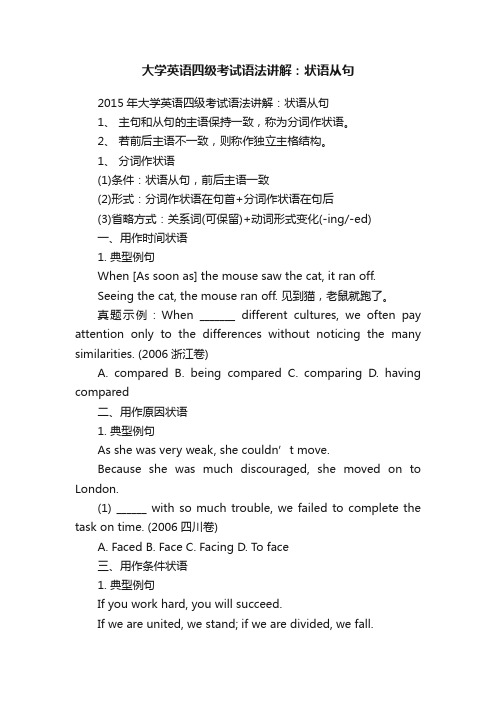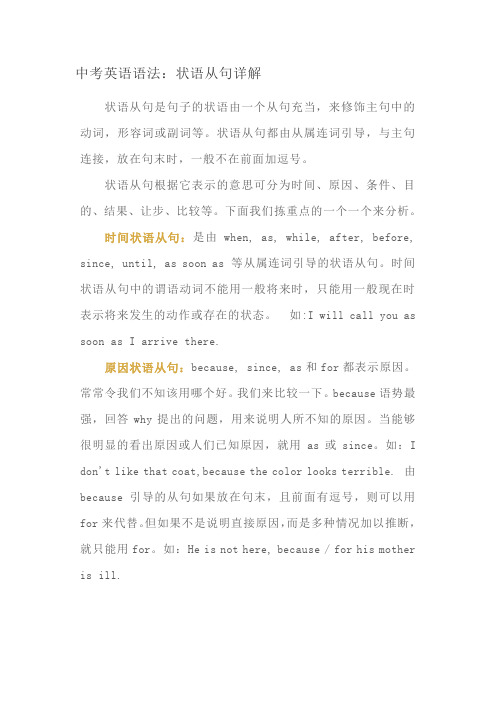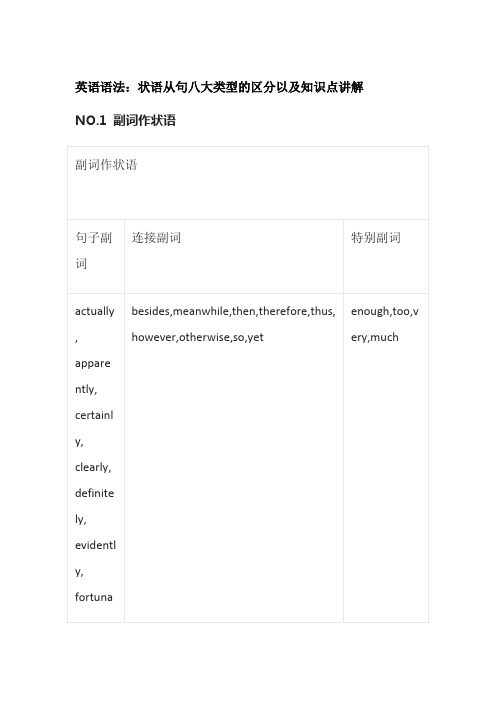语法状语从句讲解
大学英语四级考试语法讲解:状语从句

大学英语四级考试语法讲解:状语从句2015年大学英语四级考试语法讲解:状语从句1、主句和从句的主语保持一致,称为分词作状语。
2、若前后主语不一致,则称作独立主格结构。
1、分词作状语(1)条件:状语从句,前后主语一致(2)形式:分词作状语在句首+分词作状语在句后(3)省略方式:关系词(可保留)+动词形式变化(-ing/-ed)一、用作时间状语1. 典型例句When [As soon as] the mouse saw the cat, it ran off.Seeing the cat, the mouse ran off. 见到猫,老鼠就跑了。
真题示例:When _______ different cultures, we often pay attention only to the differences without noticing the many similarities. (2006浙江卷)A. comparedB. being comparedC. comparingD. having compared二、用作原因状语1. 典型例句As she was very weak, she couldn’t move.Because she was much discouraged, she moved on to London.(1) ______ with so much trouble, we failed to complete the task on time. (2006四川卷)A. FacedB. FaceC. FacingD. To face三、用作条件状语1. 典型例句If you work hard, you will succeed.If we are united, we stand; if we are divided, we fall.If we had been given more time, we could have done it better.四、用作让步状语1. 典型例句Although living miles away, he attended the course. 虽然住在几英里以外,他仍去上课。
中考英语语法:状语从句详解

中考英语语法:状语从句详解状语从句是句子的状语由一个从句充当,来修饰主句中的动词,形容词或副词等。
状语从句都由从属连词引导,与主句连接,放在句末时,一般不在前面加逗号。
状语从句根据它表示的意思可分为时间、原因、条件、目的、结果、让步、比较等。
下面我们拣重点的一个一个来分析。
时间状语从句:是由when, as, while, after, before, since, until, as soon as 等从属连词引导的状语从句。
时间状语从句中的谓语动词不能用一般将来时,只能用一般现在时表示将来发生的动作或存在的状态。
如:I will call you as soon as I arrive there.原因状语从句:because, since, as和for都表示原因。
常常令我们不知该用哪个好。
我们来比较一下。
because语势最强,回答why提出的问题,用来说明人所不知的原因。
当能够很明显的看出原因或人们已知原因,就用as或since。
如:I don't like that coat,because the color looks terrible. 由because引导的从句如果放在句末,且前面有逗号,则可以用for来代替。
但如果不是说明直接原因,而是多种情况加以推断,就只能用for。
如:He is not here, because / for his mother is ill.条件状语从句:由if引导的条件状语从句。
if 意为“如果”,引导条件状语从句时,表示假如有从句的动作发生就(不)会有主句的动作发生。
如:If it doesn't rain tomorrow, we will go there by bike.如果明天不下雨,我们就骑自行车去那里。
If I get there early, I can see the doctor quickly.如果我早早地到那里,我就可以快点看病。
高中英语语法状语从句精讲

高中英语语法状语从句精讲状语从句(Adverbial Clause状语从句指句子用作状语时,起副词作用的句子。
它可以修饰谓语、非谓语动词、定语、状语或整个句子。
根据其作用可分为时间、地点、原因、条件、目的、结果、让步、方式和比较等从句。
状语从句一般由连词(从属连词引导,也可以由词组引起。
从句位于句首或句中时通常用逗号与主句隔开,位于句尾时可以不用逗号隔开。
定义在句子中充当除谓语以外的各种句子成分的动词形式叫做非谓语动词(the Non-Finite Verbs。
非谓语动词也是动词的一种,他们有着动词的其他特点,可以充当主语、宾语、状语等。
非谓语动词与谓语动词是相对的概念。
状语从句的种类1.时间状语从句2.地点状语从句3.原因状语从句4.条件状语从句5.目的状语从句6.让步状语从句7.比较状语从句8.方式状语从句9.结果状语从句状语从句的时态特点一般情况下,时间和条件状语从句的谓语动词一般用“一般现在时”表示“一般将来时”,用“现在完成时”表示“将来完成时”。
例如:I will call you as soon as I arrive in Beijing.我到北京就将给你打电话。
(这是由as soon as引导的时间状语从句,从句中的谓语动词arrive是一般现在时,表示一般将来时,决不可用will arrive As soon as I have finished this work,I will go home.我一完成此工作,就回家。
(从句中的谓语动词用现在完成时have finished,表示将来完成时,决不可用will h ave finishedIf he comes back,please let me know.如果他回来了,请通知我。
(从句中的谓语动词用comes back,表示一般将来时,决不可用will come back状语从句讲解和练习状语修饰动词、形容词、副词或整个句子。
语法课件:状语从句

让步状语 从句
比较状语 从句 方式状语 从句
△状语从句讲解△
一、时间状语从句
1.when,while,as的特殊点 (1)表示带有规律性的“每当”或从句和主句的动作
存在先后关系时,一般用when。 (2)when可用作并列连词,意为“在那时,突然”, 常用于下列句式: be about to do--- when;be doing--- when; be on the point of doing--- when; sb.had just done sth.when--(3) 表达“随着”或“一边 …… 一边 ……” 的含义时, 一般用as。 (4)as 作“当 …… 时候”解,从句的谓语一般不可是 状态动词。 (5)while从句的谓语动词不可是短暂性的。
续表
状语从句 目的状语 从句 例句 Speak clearly, so that they may understand you. 说清楚些以便他们都能听懂。 He left early in case he should miss the train.他 早早地离开,以防误了火车。 Child as he is, he knows a lot.尽管他还是个孩 although, though, as, 子,他却知道很多。 even if/though, however, whatever, Whatever (=No matter what) you say, I'll never whether...or, no matter change my mind.不管你说什么,我都不会改 who/when/what... 变主意。 I have made a lot more mistakes than you have. 我犯的错误比你犯的多得多。 than, so/as...as, the more...the more... The busier he is, the happier he feels.越忙他觉 得越快乐。 You must do the exercise as I show you.你必须 as, as if/though, the 按照我教你的去做练习。 way, rather than... He acted as if nothing had happened.从他的举 止行为看,似乎什么也没发生过。 引导词 so, so that, in order that, in case (以防, 以免)
【语法讲解】高中英语--状语从句专题讲解(详细)

主句如果是否定句,则此时主句谓语动词用非延续性动词,表示主句的动作从从句表示的时间点才开始,即“直到…才…”
Ididn’t knowanything about it until you told me(否定句,谓语为非延续性动词)
2)主句是肯定句时
主句如果是肯定句,则此时主句谓语动词用延续性动词,表示主句的动作直到从句表示的时间点就结束,即“直到…为止”。
No sooner had he reached home than it began to rain.
= He had no sooner reached home than it began to rain.
Hardly had I told him the news when he stopped listening.
=I hardly told him the news when he stopped listening.
地点状语从句
地点状语从句的引导词有when和wherever。
where, wherever指具体地点时,从句可用于主句之前或之后;
where, wherever表示抽象概念的含义时,从句需放在主句前。
While wewere waiting forthe bus, it was raining heavily.(延续性)
while和as常表示从句的动作与主句的动作同时发生,而when表示从句的动作发生在主句动作之前、之后,也可同时发生。
Theyrushed inwhile/as wewere discussingproblems.(同时发生)
2)从句谓语动词不同,表达的意义不同。
since引导的从句谓语如果是延续性动词或表示状态的动词,则从句表示的时间是从该动作或状态结束时算起。
中考英语语法:状语从句详解

中考英语语法:状语从句详解状语从句是句子的状语由一个从句充当,来修饰主句中的动词,形容词或副词等。
状语从句都由从属连词引导,与主句连接,放在句末时,一般不在前面加逗号。
状语从句根据它表示的意思可分为时间、原因、条件、目的、结果、让步、比较等。
下面我们拣重点的一个一个来分析。
时间状语从句:是由when, as, while, after, before, since, until, as soon as 等从属连词引导的状语从句。
时间状语从句中的谓语动词不能用一般将来时,只能用一般现在时表示将来发生的动作或存在的状态。
如:I will call you as soon as I arrive there.原因状语从句:because, since, as和for都表示原因。
常常令我们不知该用哪个好。
我们来比较一下。
because语势最强,回答why提出的问题,用来说明人所不知的原因。
当能够很明显的看出原因或人们已知原因,就用as或since。
如:I don't like that coat,because the color looks terrible. 由because引导的从句如果放在句末,且前面有逗号,则可以用for来代替。
但如果不是说明直接原因,而是多种情况加以推断,就只能用for。
如:He is not here, because / for his mother is ill.条件状语从句:由if引导的条件状语从句。
if 意为“如果”,引导条件状语从句时,表示假如有从句的动作发生就(不)会有主句的动作发生。
如:If it doesn't rain tomorrow, we will go there by bike. 如果明天不下雨,我们就骑自行车去那里。
If I get there early, I can see the doctor quickly. 如果我早早地到那里,我就可以快点看病。
英语语法方式状语从句讲解

英语语法方式状语从句讲解英语语法方式状语从句讲解方式状语从句通常由as, (just) as…so…, as if, as though引导,方式状语从句。
1)as, (just) as…so…引导的方式状语从句通常位于主句后,但在(just) as…so…结构中位于句首,这时as从句带有比喻的含义,意思是"正如…","就像",多用于正式文体,例如:Always do to the others as you would be done by.你希望人家待你,你就要怎样待人。
As water is to fish, so air is to man.我们离不开空气,犹如鱼儿离不开水。
Just as we sweep our rooms, so we should sweep backward ideas from our minds.正如打扫房屋一样,我们也要扫除我们头脑中落后的东西。
2) as if, as though两者的意义和用法相同,引出的.状语从句谓语多用虚拟语气,表示与事实相反,有时也用陈述语气,表示所说情况是事实或实现的可能性较大,语法《方式状语从句》。
汉译常作"仿佛……似的","好像……似的",例如:They completely ignore these facts as if (as though) they never existed.他们完全忽略了这些事实,就仿佛它不存在似的。
(与事实相反,谓语用虚拟语气。
)He looks as if (as though) he had been hit by lighting.他那样子就像被雷击了似的。
(与事实相反,谓语用虚拟语气。
)It looks as if the weather may pick up very soon.看来天气很快就会好起来。
英语语法:状语从句八大类型的区分以及知识点讲解

英语语法:状语从句八大类型的区分以及知识点讲解NO.1 副词作状语(1)句子副词:句子副词用于修饰句子(而不是修饰某个单个的词),反映说话人的观点和看法。
如actually, apparently, certainly, clearly,definitely, evidently, fortunately, frankly, honestly, luckily, obviously, perhaps, possibly, probably, surely, undoubtedly, unexpectedly 等。
作用以及位置:句子副词通常位于句首(或分句句首)。
Eg:Obviously he can't tell the difference between them. 显然他无法区别两者的不同。
I arrived late but luckily the meeting had been delayed. 我迟到了,幸而会议推迟了。
但有些句子副词也可以出现句中。
eg:He smiled nastily. He evidently knew something I didn't. 他发出狞笑,他显然知道一些我所不知道的事。
有的句子也可用作其他种类的副词,不过这往往会导致位置和语义的变化:Clearly he didn't say so. 显然他没有这样说。
(句子副词)He didn't say so clearly. 他说得没有那么清楚。
(方式副词)(2)起连词作用的副词连接副词就是连接词,如besides,meanwhile,then, therefore, thus, However,Otherwise, so, yet 等。
作用以及位置:常放在两个句子中间,前面为逗号,后面放连接词,从句之前。
注意:so 也可放在形容词之前做修饰,yet 可放句尾或从句之前。
- 1、下载文档前请自行甄别文档内容的完整性,平台不提供额外的编辑、内容补充、找答案等附加服务。
- 2、"仅部分预览"的文档,不可在线预览部分如存在完整性等问题,可反馈申请退款(可完整预览的文档不适用该条件!)。
- 3、如文档侵犯您的权益,请联系客服反馈,我们会尽快为您处理(人工客服工作时间:9:00-18:30)。
法状从句由从句担任的状,在句子中可修〔或其它〕、形容、副或是整个句子,它可以用来表示、地点、原因、目的、果、条件、方式、比、步等。
第一,地点状从句状从句:when, while, as, before, after, since , wheneveruntil, till, by the time(注意)as soon as, had hardly⋯when, had no sooner⋯than,(on doing sth⋯)the moment, every time/ each time, the first time, once:When he came, I had cleaned the classroom.He didn ’t stop working until his mother came bake.He worked until his mother came back.As soon as he returned, he bought a new flat.He had no sooner returned than he bought a new flatHe came to scene the moment he heard the news.I thought her nice and honest the first time I met him.Once he makes up your mind, he won’t change his mind.It was two years before I met him again. = Two years passed before I met himagain.注意点 1. when引的从句可以是延性的或短性的,while引的从句中必是延性的;while有并不表示,而表示比,表示“而〞、“却〞。
When I got home I found the door locked.While( 或 When)we were working in the fields, it suddenly began to rain.His pencil is red, while mine is yellow.2. till与until not ⋯until/till解直到⋯才⋯主句一般是短性的⋯till/until⋯解直到⋯止主句一般是延性的一般情况下可以互,但until可以位于句首,till不能。
He worked until it was dark.He didn ’t stop working until it was dark.Until it stops raining,the children can’ t go out.= Not until the rain stops can the children go out.地点状从句引地点状从句的是where 和 wherever 等。
I ll go wherever the people want me to go.(wherever=to any place where)He works where his grandfather fought.(where=in the place where)You must stay where you are. = You must stay in the place where you are.Wherever you go, I go too.Where there is water, there is life.(那儿有⋯那儿就有⋯Where there is a will,there is a way.)圈出其中的从句并翻:1.Whenever it is his turn to speak, he gets nervous.2.Every time he comes, he always tells us something interesting.3.When I get the news, I will let you know as soon as possible.4.Once he makes a promise, he will never break it.5.I had no sooner run into the school gate than I heard the bell for class.6.I found the lost watch under a desk after the children had left for home.7.He had to be called two or three times before he came down to dinner.8.We didn ’ t notice anything wrong with the washer until we started using it.9.The hunter made mark on the tree where he stops.10.Wherever he is, he will find time to do some reading.第二原因、目的、果状从句原因状从句原因状从句是表示原因或理由的,引从句的最常用的是because, since, as , now that 〔既然〕等,for表示因果关系〔它引的不是从句〕并列,气不如because, considering that, seeing that(既然,由于)not that⋯but that⋯ (不是因⋯而是因⋯) . He is disappointed because he didn't get the position.Since everybody is here, let’s begin.It must have rained last night, for the ground is still wet.Se eing that the weather is bad, we’ll stay at home.注意点 : 1.答复以why提出的,只能用because, 而不能用as 等。
2.since = now(that), 表“既然〞意,表示的或明的原因,由此加以推。
Now that/Since you are free today,you may have a rest at home or go out fora walk.3.for 是一个并列,用来接两个并列句,引的句子是前面一句的内容的推或充明。
( 一般有逗号逗开 )The day has broken, for the birds are singing.4.区几个介短: because of , due to, owing to, on account of目的状从句引有so that, in order that, that, in case〔免得,以防〕, for fear that。
目的状从句常含有can/could/may/might/will/would等情。
: He said aloud so that everybody could hear him.I left the room quietly for fear that I might wake him up.Speak clearly, so that they may understand you.He left early in case he should miss the train.果状从句果状从句是表示事果的从句,通常主句是原因,从句是果。
由so that〔从句一般没有情〕 , so⋯that, such⋯that等引。
1.He works so hard that he makes great progress in his studies.2.I t s such a difficult problem that nobody can work it out.3. There s not any noise here so that I feel very comfortable.. I got up early, so that I caught the bus.I got up early so that I could catch the bus.圈出其中的从句并翻1.He had to do a part-time job after work because he needed money for his marriage.2. Since you know you are wrong, you’ d better admit it.3.I didn ’ t go to see him, for a heavy snow was falling.4.Seeing that the weather is bad, we will stay at home.5.He always takes a seat in the first row so that he can hear better.6.In order that they can have more time for study, they often eat fast food.7.She had such a good experience that I would always remember it.8.I stayed up late last night, so that I felt sleepy in class today.9.I wrote as clearly as possible so that I might get high marks.10.I wrote as clearly as possible, so that I got high marks.第三条件、方式、比、步状从句条件状从句条件状从句分真性〔有可能的事情〕与非真性〔条件与事相反或者在者看来不大可能的事情〕条件句。
引条件状从句的〔〕主要有if,unless,in case,so/as long as, on condition that, provided that, supposing that等. If he is not in the office, he must be out for lunch.So far as I know〔据我所知〕, he will be away for three months.You can go swimming on condition that ( = if ) you don’t go too far away fromthe river bank.In case he comes, let me know.As long as you don’t lose heart, you will succeed.Unless you work hard, you won’t pass th e exam.If you doesn’t work hard, you won’t pass the exam注意: 1.条件从句中的if不能用whether替。
